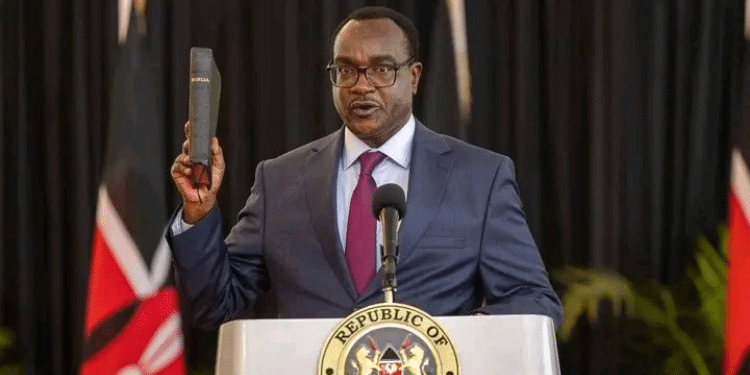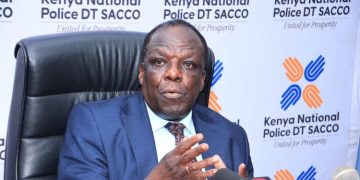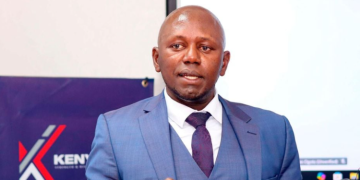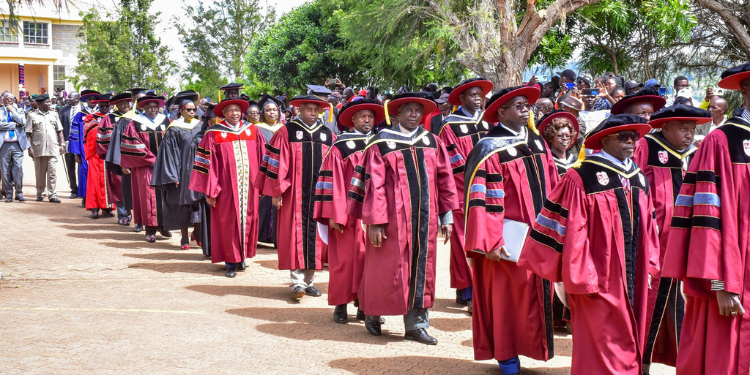To become a fully-fledged professor in Kenya, one must climb a long and demanding academic ladder beginning with a PhD and rising through years of university teaching, research, postgraduate supervision, and scholarly publications.
A PhD in a relevant field is the foundational requirement, along with several years of experience teaching at the university level.
Additionally, a strong record of research and publication, including the supervision of postgraduate students, is crucial for promotion to the professorial rank.
The journey begins with obtaining a Bachelor’s degree, followed by a Master’s degree, and ultimately a Doctor of Philosophy (PhD) in a chosen field. This entire educational process can take up to 10 years, depending on the course and the university.
Once armed with a PhD, the next stage is entering university teaching — usually beginning as a Tutorial Fellow or Lecturer, progressing to Senior Lecturer, then to Associate Professor, and finally to Professor.
Promotion within academia depends not only on years of service but also on academic achievements such as publishing in peer-reviewed journals, attending academic conferences, securing research grants, and supervising postgraduate students.
Qualifications for Associate Professor
To be appointed as an Associate Professor, a candidate must hold a PhD or equivalent qualification from an accredited university.
They should have at least three years of teaching experience at the university level as a Senior Lecturer, researcher, or equivalent industry experience.
They must have earned a minimum of 48 publication points as a Senior Lecturer, of which at least 32 should come from refereed scholarly journals.
In addition, they should have successfully supervised a minimum of four postgraduate students to completion, including at least one doctoral student.
Qualifications for Full Professor
From the Associate Professor level, one can apply for a full Professorship. A candidate must hold a PhD or equivalent qualification in the relevant field from a recognised university.
They must also have at least three years of teaching experience as an Associate Professor or equivalent, in addition to relevant research experience.
In addition, a minimum of 60 publication points is required since the last promotion, with at least 40 of these from refereed scholarly journals.
Successful supervision of at least five postgraduate students—two of whom must be at the doctoral level—is also expected.
Furthermore, the candidate must have at least five additional articles in refereed journals since becoming an Associate Professor.
A proven record of attracting research or development funding is required, and if applicable, current registration with a relevant professional body is mandatory.
Also Read: How First Years and Continuing University Students Can Check Fees After Review
Salary Scale and Allowances
At the top level of academia, Professors at public universities such as the University of Nairobi earn a basic salary ranging from KSh170,681 to KSh248,898 per month.
They are entitled to a wide range of allowances, including a house allowance, book allowance, hardship allowance, transport, medical, mileage, baggage, and subsistence allowances.
| Allowance Type | Amount (Ksh) |
|---|---|
| House to Office (motor vehicle) | 18,590.00 |
| House to Office (other transport) | 14,666.00 |
| Book Allowance | 39,618.00 |
| House Allowance | 66,344.00 |
| Mileage Allowance | As per AA rates |
| Leave Travelling Allowance | 25,015.00 |
| Transfer Allowance | 40,000.00 |
| Clinical Allowance (Veterinary teaching staff) | 6,000.00 |
| Hardship Allowance | 45,000.00 |
| Optical Allowance | 27,696.00 |
| Dental Allowance | 27,696.00 |
| In-Patient Cover | 1,815.00 |
| Passage Allowance | 6,576.00 |
| Baggage Allowance | 10,960.00 |
| Subsistence Allowance | 16,800.00 |
| Day Trip Allowance | 2,250.00 |
| Meals Allowance (Breakfast) | 750.00 |
| Meals Allowance (Lunch/Dinner) | 1,500.00 |
Also Read: Prof Faith Njoki Karanja: First Kenyan Woman to Attain a PhD in Geoinformatics
PhD Requirements and Timeline
Doctoral degrees require PhD candidates to take advanced courses, pass a comprehensive exam (sometimes called “comps”), and produce an original body of research, such as a dissertation, to obtain the degree.
PhD Requirements:
- Advanced Coursework: Graduate-level courses that dive deeply into sub-topics within your field.
- Comprehensive Exam (Comps): A comprehensive exam to assess your knowledge in your field, covering history, theories, and major research.
- Dissertation: Original research that contributes new knowledge to your field.
- Teaching or Research Assistantship (Optional): Some programs require you to gain experience in academia or research through a teaching or research assistant role.
PhD Timeline:
- Year 1: Complete advanced coursework to build a strong foundation in your field.
- Year 2: Finish advanced coursework and start preparing for comprehensive exams.
- Take and defend your comprehensive exams; begin drafting your dissertation proposal in year 3.
- Year 4: Submit and get approval for your dissertation proposal, then begin work on your dissertation.
- Year 5: Finish writing your dissertation, submit for committee approval, and defend your research. Apply for graduation after approval.
Cost of a PhD Across Kenyan Universities
Follow our WhatsApp Channel and X Account for real-time news updates.





















































![Senator Allan Chesang And Chanelle Kittony Wed In A Colourful Ceremony [Photos] Trans Nzoia Senator Allan Chesang With Channelle Kittony/Oscar Sudi]( https://thekenyatimescdn-ese7d3e7ghdnbfa9.z01.azurefd.net/prodimages/uploads/2025/11/Trans-Nzoia-Senator-Allan-Chesang-with-Channelle-KittonyOscar-Sudi-360x180.png)
























Dear Sir
What is the criterion for getting the visiting/ online professor position in Kenya?
A whole professor is paid 170k while class 8 dropout earn 800k? It’s unfair for professors